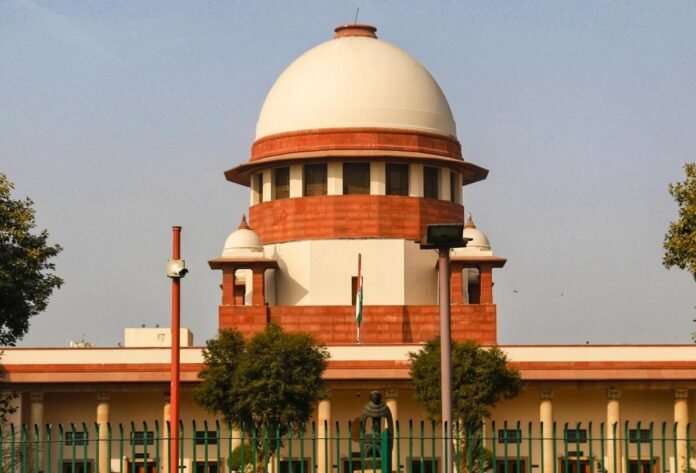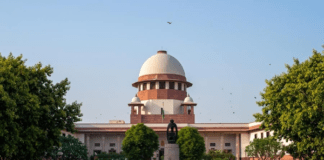Supreme Court asks if Parliament can reintroduce provisions earlier struck down in the Tribunal Reforms Act 2021, raising key constitutional questions.
The Supreme Court has questioned the Union Government on the constitutionality of reintroducing provisions previously struck down, while hearing challenges to the Tribunal Reforms Act, 2021.
In a crucial constitutional hearing, the Supreme Court on Tuesday asked the Union Government to explain the rationale behind the Tribunal Reforms Act, 2021, particularly questioning how Parliament could reintroduce provisions that had already been declared unconstitutional in earlier judgments.
A bench comprising Chief Justice of India B.R. Gavai and Justice K. Vinod Chandran was hearing the Madras Bar Association petition that challenges the Act’s validity. The Court’s sharp query—whether Parliament could re-legislate what the Court had previously invalidated—goes to the heart of India’s separation of powers and judicial supremacy in constitutional interpretation.
Background of the Dispute
The Tribunal Reforms Act, 2021 replaced several tribunals and amended the service conditions of their members. However, the Madras Bar Association contended that the new law mirrors provisions already struck down in Madras Bar Association v. Union of India (2020) and earlier rulings.
In those judgments, the Supreme Court held that:
- Tribunal members should have a minimum tenure of five years, not three.
- Advocates with at least 10 years of experience must be eligible for appointment.
- The executive’s control over appointments and service conditions should be limited to preserve judicial independence.
Despite these directives, the 2021 Act retained several contentious features, prompting fresh constitutional scrutiny.
Court’s Sharp Observations
During the hearing, CJI Gavai asked the Solicitor General:
“What was the thought process behind enacting a law that seems to reintroduce provisions this Court had already struck down? Can Parliament simply bring back the same law in a different form?”
Justice Chandran added that while Parliament has legislative supremacy, it cannot act in disregard of binding judicial pronouncements interpreting the Constitution.
The Court’s remarks echoed long-standing tensions between the legislature’s power to legislate and the judiciary’s authority to interpret the Constitution.
The Centre’s Stand
Representing the Union, the Solicitor General argued that the Tribunal Reforms Act was enacted after considering judicial observations but within the legislature’s policy domain. He submitted that Parliament, while respecting previous rulings, has the competence to legislate afresh provided the constitutional defects are addressed.
The government maintained that the Act seeks to “streamline” tribunal administration, reduce delays, and improve efficiency, while also asserting that it does not undermine judicial independence.
The Constitutional Question: Can Parliament Reenact Struck-Down Laws?
This case raises a foundational question in Indian constitutional law—can Parliament reintroduce provisions declared unconstitutional by the Supreme Court?
According to legal experts, Parliament may enact a law addressing the same subject if it remedies the defects pointed out by the Court. However, reintroducing identical provisions amounts to defying the Court’s authority and violates the principle of judicial finality.
Precedents such as State of Tamil Nadu v. State of Kerala (2014) and Madras Bar Association (2020) underline that legislative overruling of judicial decisions is impermissible unless the basis of the judgment is constitutionally altered through a valid amendment or modified factual context.
Advocates’ Perspective
Senior advocates appearing for the Madras Bar Association argued that the Tribunal Reforms Act, 2021 is a direct affront to the judiciary’s directions. They claimed it “defies judicial authority” by replicating provisions—such as short tenure and restricted eligibility criteria—that had already been categorically struck down.
They further contended that the Act compromises tribunal independence, effectively placing tribunals under executive control, contrary to the doctrine of separation of powers and the basic structure of the Constitution.
Broader Implications
This litigation carries significant implications:
- Institutional Balance: It tests the constitutional boundaries between Parliament’s legislative power and the Supreme Court’s interpretive supremacy.
- Judicial Independence: It will determine how far the executive can influence tribunal composition and functioning.
- Legislative Accountability: The verdict could redefine how legislatures respond to prior judicial rulings.
If the Supreme Court strikes down the law again, it will reinforce the judiciary’s stance that legislative defiance of court judgments cannot be tolerated. Conversely, upholding the Act could expand Parliament’s scope to re-legislate on contentious matters.
Expert Reactions
Legal commentators have noted that while Parliament may have the power to legislate, it must exercise that power in conformity with constitutional principles. The Kovach-Rosenstiel framework from The Elements of Journalism emphasizes transparency, accountability, and independence—all critical in this discourse.
Experts also cite Alain de Botton’s analysis in The News: A User’s Manual—that public institutions should question authority with nuance rather than sensationalism. Here, the Court’s questions seek to ensure constitutional discipline, not confrontation.
What Lies Ahead
The Supreme Court has reserved further directions and sought a detailed affidavit from the Union Government explaining the legislative intent behind the Tribunal Reforms Act, 2021. The matter will continue to test the evolving relationship between legislative power and judicial review in India’s constitutional scheme.
For readers following judicial updates, visit The Legal Observer – News Section or watch expert discussions on YouTube @TheLegalObserver.
Internal Links Used: The Legal Observer, News Section, National News
External Link Used: YouTube @TheLegalObserver





